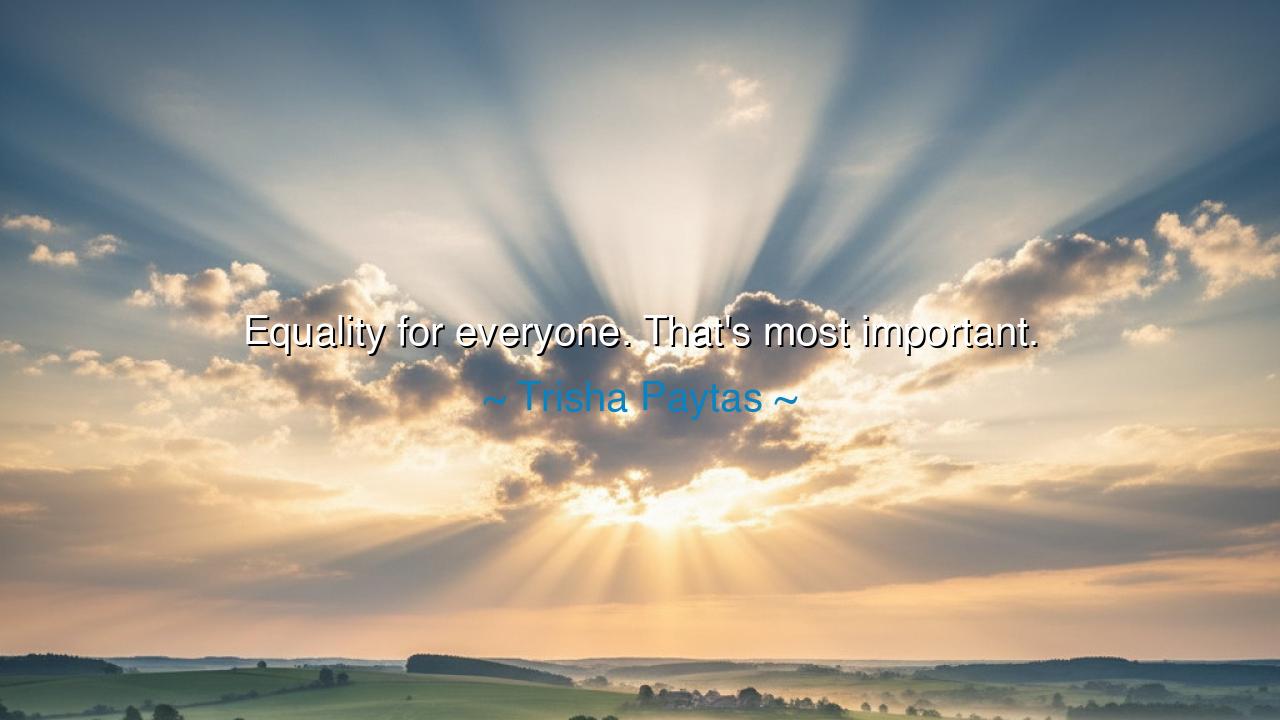
Equality for everyone. That's most important.






“Equality for everyone. That’s most important.” So declares Trisha Paytas, and though the words are simple, their weight is immense. For in this brief utterance lies the echo of centuries of struggle, the cry of countless voices who longed to be seen, heard, and honored. Simplicity often hides profundity, and here the truth shines bright: if there is one foundation upon which a just society must rest, it is equality—not for some, not for many, but for all.
The ancients understood that civilization collapses when fairness is denied. The philosophers of Greece spoke of justice as giving each their due; the prophets of old cried out against the oppression of widows, orphans, and strangers. To say “equality for everyone” is to gather all these voices into one and to declare that no human, by birth or by circumstance, is lesser. It is to strip away the illusions of hierarchy, the false crowns of privilege, and to stand before one another as kin in the same human family.
Consider the long struggle of the Civil Rights Movement in America. There, ordinary men and women walked roads lined with hatred, fire hoses, and dogs, yet they marched onward for a simple dream: that black and white children might sit together at the same desk, that every citizen might cast a vote, that dignity might not be rationed by color. When Martin Luther King Jr. declared, “I have a dream,” it was but another way of saying, “Equality for everyone—that’s most important.” The phrase that Paytas speaks is not new, but a torch carried through the ages.
And look further back, to the struggles of women who sought the right to be educated, to work, to speak, to vote. For centuries, their voices were dismissed as unworthy. Yet leaders such as Susan B. Anthony and Emmeline Pankhurst rose and declared that equality cannot exclude half the human race. Their persistence, their sacrifices, their defiance brought forth freedoms that many now take for granted. Their lives, too, are testimony to the truth of Paytas’s words: when equality is denied, justice withers; when it is granted, all humanity thrives.
Yet let us not imagine that the journey is finished. Even in our time, the chains of prejudice still bind. The poor are silenced, the marginalized ignored, the stranger treated with suspicion. Paytas’s declaration calls us to vigilance, for it is not enough to admire equality in principle—we must labor for it in practice. To proclaim “for everyone” is to stretch our compassion even to those we do not understand, even to those unlike ourselves. That is the heroic demand of true equality: to see dignity where others see only difference.
What, then, is the lesson? It is that equality is not a gift handed down from the powerful but a discipline practiced by each of us daily. It begins in the heart, when we recognize the worth of another. It continues in our words, when we speak with respect and refuse to demean. And it culminates in our actions, when we defend the weak, amplify the unheard, and open doors where walls once stood. The path is not always grand—it is carved by daily choices, by courage in small things.
Practical wisdom follows: in your home, treat each voice as worthy of hearing; in your work, honor the contributions of all; in your community, stand against prejudice, even when silence would be easier. Let your life itself become a testament to the creed that equality for everyone is indeed the most important truth. For when equality reigns, freedom flowers, peace deepens, and the human family walks more closely toward the destiny it was always meant to share.
Thus, though spoken in plain language, Paytas’s words carry the same fire as those of prophets and revolutionaries. Let them not pass by you lightly. Take them as a call, simple yet profound: live as one who knows that equality is the measure of justice, the root of compassion, and the heart of humanity’s hope. Equality for everyone—that is most important. And if you carry this truth into your days, you will become part of the unbroken chain of those who have struggled, suffered, and triumphed for the dignity of all.






AAdministratorAdministrator
Welcome, honored guests. Please leave a comment, we will respond soon